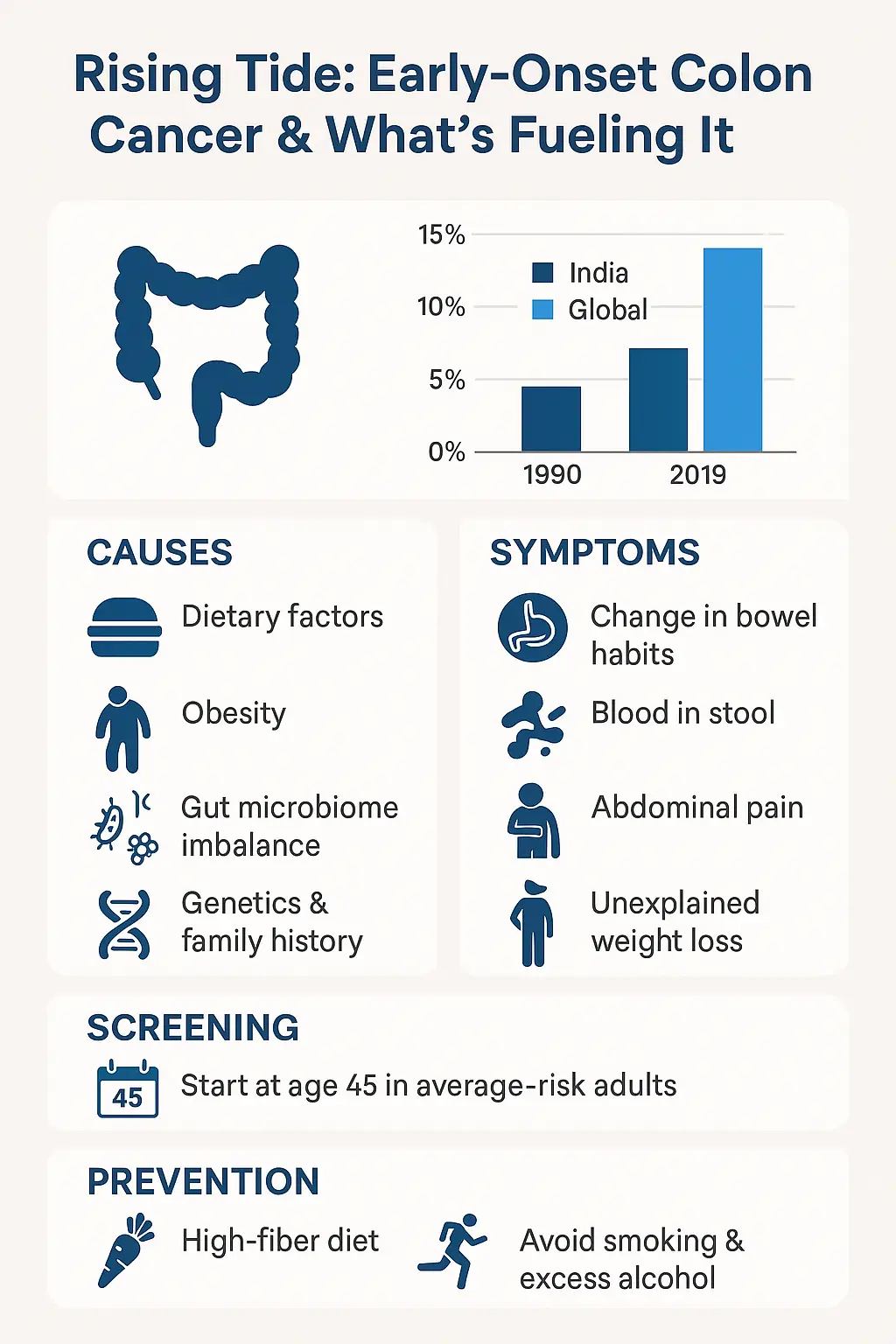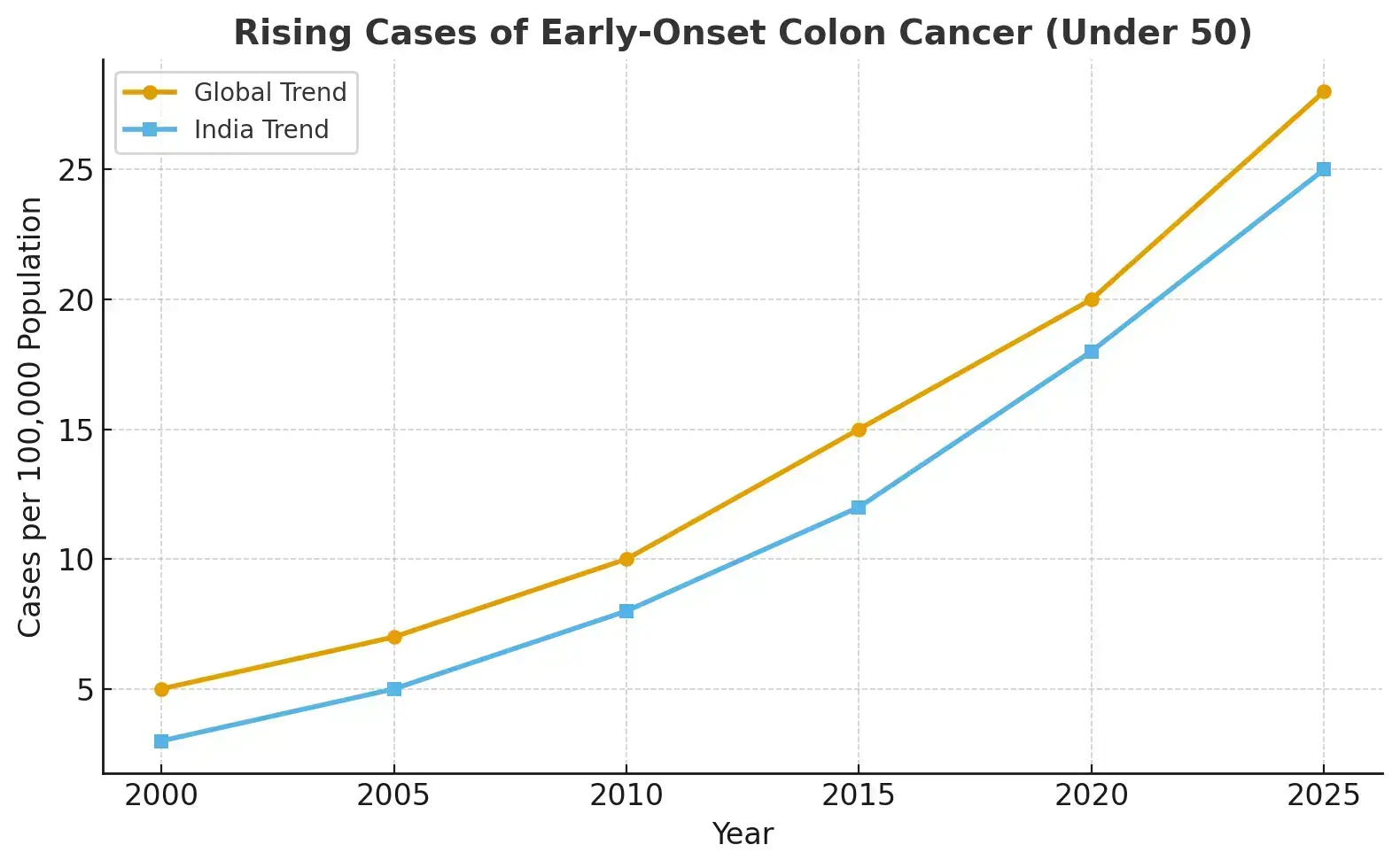Introduction
Colon cancer, also called colorectal cancer, has traditionally been considered a disease of older adults. However, recent studies and cancer registries reveal a worrying trend: rising cases of colon cancer in younger adults under the age of 50. This phenomenon, known as early-onset colorectal cancer (EO-CRC), is now a growing global concern and demands greater awareness among both patients and healthcare providers.
The Alarming Trend
- Data published in international cancer journals shows a steady increase in early-onset colon cancer cases over the last two decades.
- In India too, oncologists are witnessing a similar trend where younger patients are presenting with advanced colorectal cancer, often due to delayed detection.
- Unlike older patients, younger adults are less likely to be screened, which means cancers are often caught late.
Possible Causes of Early-Onset Colon Cancer
While research is ongoing, several risk factors are emerging as possible drivers:
- Dietary changes: High consumption of ultra-processed foods, red meat, and sugary drinks may play a role.
- Gut microbiome imbalance: Disruption in healthy gut bacteria and exposure to bacterial toxins (like colibactin from certain E. coli) may cause genetic mutations.
- Obesity and sedentary lifestyle: Increasing rates of obesity in younger people are linked with higher colon cancer risk.
- Genetics & family history: Inherited syndromes like Lynch syndrome or familial adenomatous polyposis significantly increase risk.
- Environmental exposures: Early-life exposure to carcinogens, lifestyle stress, and reduced fiber intake are also being studied.
Warning Signs That Should Not Be Ignored

One of the biggest challenges with early-onset colorectal cancer is that symptoms are often dismissed as minor digestive issues. Here are some red-flag symptoms to watch for:
- Persistent change in bowel habits (constipation/diarrhea)
- Blood in stool (even small amounts should not be ignored)
- Unexplained abdominal pain or cramping
- Fatigue and iron-deficiency anemia
- Unexplained weight loss
If these symptoms persist, it is important to consult a colorectal cancer specialist immediately.
Rethinking Screening Guidelines
Traditionally, colon cancer screening (via colonoscopy or stool tests) was recommended starting at age 50. However, with the rise of EO-CRC, many global health bodies are now recommending starting screening at age 45 for average-risk individuals, and even earlier for those with family history or genetic predisposition.
India too must adapt screening strategies to identify at-risk younger populations early.
Prevention & Awareness
- Adopting a high-fiber diet (fruits, vegetables, whole grains)
- Regular exercise and maintaining healthy weight
- Avoiding tobacco and limiting alcohol consumption
- Being aware of family history and genetic risk factors
- Seeking timely medical advice for persistent digestive symptoms
Conclusion
The rise in early-onset colon cancer is a wake-up call for both medical professionals and the general population. Awareness, lifestyle modification, and earlier screening are crucial to tackling this alarming trend.
For patients seeking expert care, Dr. Rajeev Kapoor, a renowned colorectal cancer surgeon in Mohali, India, offers advanced diagnosis and surgical treatment options for colon cancer, ensuring world-class care with compassionate expertise.


